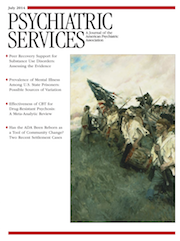Smoking Cessation Among People Seeking Mental Health Treatment
Abstract
Objective
This study examined smoking cessation characteristics of smokers who reported seeking mental health treatment.
Methods
Data for adult current smokers (N=18,939) were combined from the 2000, 2005, and 2010 National Health Interview Survey. Multivariate regressions were used to assess associations between smoking cessation behaviors, cessation-related social norms, and mental health treatment.
Results
Smokers (N=1,897) who reported seeing mental health professionals for mental health problems had higher odds of having made attempts to quit in the past year (odds ratio [OR]=1.17), of having used nicotine replacement therapy (OR=1.28), and of using face-to-face counseling (OR=2.40), telephone quit lines (OR=1.81), and support groups (OR=1.63) to assist smoking cessation. They were more likely to have been advised by health professionals to quit smoking (OR=1.62) but less likely to live in a smoke-free home (OR=.78). Use of smoking cessation treatments and prevalence of smoke-free homes increased over the sampling period.
Conclusions
Findings highlight the need for tailored efforts to reduce tobacco use among people with mental health problems.



